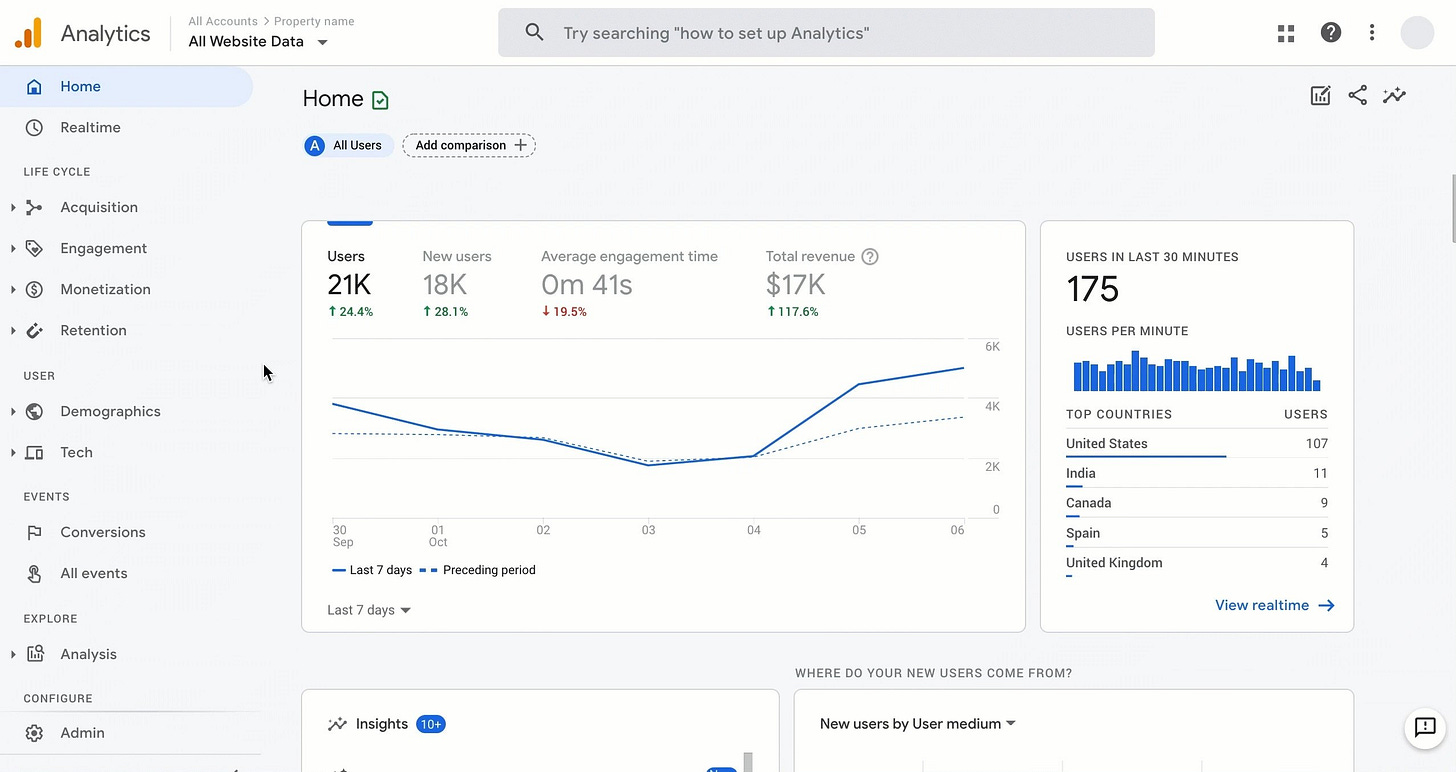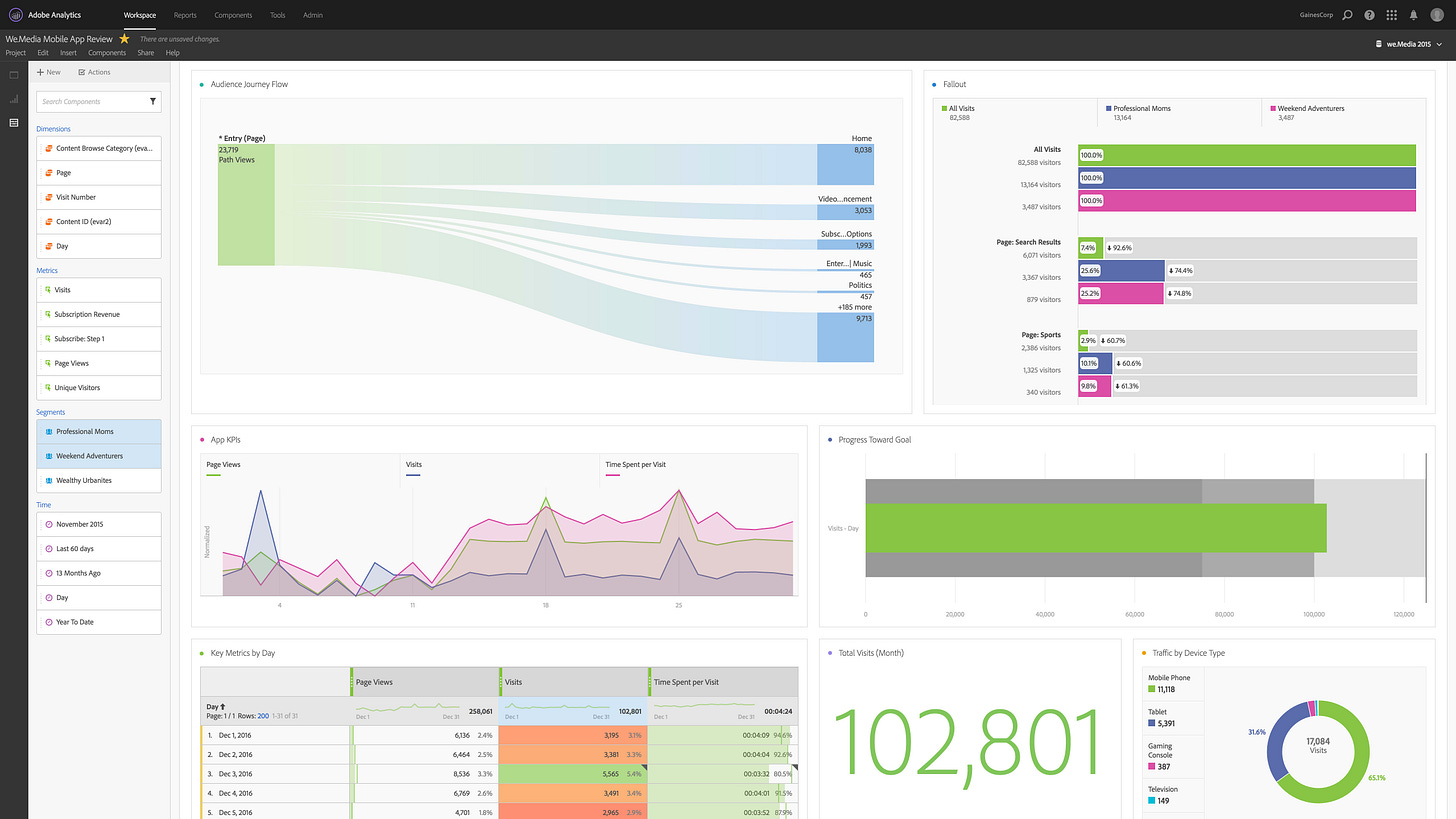Unlocking the Power of Marketing Analytics: A Guide for Digital Marketers and Consultants
In today's digital age, marketing analytics has become an indispensable tool for digital marketers and consultants alike. But what does it really mean to unlock the power of marketing analytics? How can it transform your marketing strategies and deliver measurable results?
Whether you're a seasoned professional or just starting out, this comprehensive guide will equip you with the knowledge and skills needed to harness the full potential of marketing analytics. From understanding key metrics to implementing data-driven strategies, we'll delve into the world of analytics and show you how to leverage it to improve campaign performance, optimize customer journeys, and boost return on investment.
Are you ready to unlock the power of marketing analytics? Let's dive in!
Why is marketing analytics important?
Marketing analytics plays a crucial role in today's digital landscape. It enables marketers and consultants to gain a deep understanding of their target audience, identify trends, and measure the success of their campaigns.
But why is it so important? By analyzing data from various channels such as website traffic, social media engagement, and email marketing, you can make informed decisions and optimize your marketing strategies. Marketing analytics provides insights into customer behavior, preferences, and purchasing patterns, allowing businesses to tailor their marketing efforts and deliver personalized experiences.
Additionally, marketing analytics helps in tracking the effectiveness of marketing campaigns, identifying areas of improvement, and allocating resources effectively. With the power of marketing analytics, you can stay ahead of the competition and drive growth.
Key metrics in marketing analytics
To effectively utilize marketing analytics, it is crucial to understand the key metrics that drive insights and measure success. Some of the essential metrics include:
Conversion Rate
The percentage of visitors who take the desired action, such as making a purchase or filling out a form. This metric helps measure the effectiveness of landing pages and marketing campaigns. But how can you improve your conversion rate? What strategies have you tried so far?
Customer Lifetime Value (CLV)
The predicted revenue a customer will generate over their lifetime with a business. CLV helps in identifying high-value customers and tailoring marketing efforts to maximize their value. Are you focusing on your high-value customers?
Return on Investment (ROI)
The ratio of the profit generated from a marketing campaign to the cost of running that campaign. ROI helps in evaluating the effectiveness and profitability of marketing activities. Are your marketing activities delivering a good ROI?
Click-Through Rate (CTR)
The percentage of people who click on a specific link, advertisement, or call-to-action. CTR is a valuable metric for measuring the success of online advertising and email marketing campaigns. How can you improve your CTR?
Bounce Rate
The percentage of visitors who leave a website after viewing only one page. A high bounce rate indicates that the website or landing page may need optimization. What steps are you taking to reduce your bounce rate?
Understanding these key metrics and how they relate to your marketing goals will enable you to make data-driven decisions and optimize your marketing efforts.
Tools for marketing analytics
To effectively analyze and interpret marketing data, a wide range of tools are available. These tools help collect, organize, and analyze data from various sources, providing valuable insights and visualizations. Some popular marketing analytics tools include:
Google Analytics
A free and widely-used tool that provides detailed website traffic data, user behavior insights, and conversion tracking. Google Analytics offers a comprehensive set of features to measure and analyze marketing performance. Are you making the most of Google Analytics?
HubSpot
A powerful inbound marketing and sales platform that offers analytics and reporting capabilities. HubSpot provides tools for tracking website visits, lead generation, and customer interactions, allowing you to measure the impact of your marketing efforts. How are you using HubSpot to track your marketing efforts?
Adobe Analytics
A robust enterprise-level analytics solution that offers real-time data collection, advanced segmentation, and predictive analytics. Adobe Analytics provides in-depth insights into customer behavior and enables marketers to optimize their campaigns across multiple channels. Are you leveraging Adobe Analytics for your marketing campaigns?
SEMRUSH
A comprehensive SEO toolset that includes keyword research, link analysis, and website performance tracking. SEMRUSH helps marketers improve their search engine rankings and visibility, ultimately driving traffic and conversions.
These are just a few examples of the many tools available for marketing analytics. Choosing the right tools for your business depends on your specific needs, budget, and technical capabilities.
How to set up your marketing analytics framework
To unlock the full potential of marketing analytics, it is essential to set up a solid framework that aligns with your business objectives. Here are the key steps to follow:
Define your goals
Clearly define your marketing objectives and identify the key performance indicators (KPIs) that align with those goals. This will help you measure success and track progress. What are your marketing objectives?
Identify data sources
Determine the data sources you need to collect and analyze to achieve your marketing goals. This may include website analytics, social media data, CRM data, and more. What data sources are you currently using?
Implement tracking mechanisms
Set up tracking mechanisms such as tags, pixels, and cookies to collect data from your various marketing channels. This will ensure that you have accurate and comprehensive data for analysis. Are your tracking mechanisms set up correctly?
Data integration
Integrate data from different sources into a centralized analytics platform. This will allow you to gain a holistic view of your marketing efforts and identify correlations and patterns. Are you integrating your data effectively?
Data analysis and reporting
Analyze the collected data to gain insights into customer behavior, campaign performance, and overall marketing effectiveness. Create comprehensive reports and visualizations to communicate these findings effectively. Are you analyzing your data and reporting your findings effectively?
By following these steps and establishing a robust marketing analytics framework, you will be able to make data-driven decisions and optimize your marketing strategies for maximum impact.
Data collection and analysis
Collecting and analyzing data is at the core of marketing analytics. It involves capturing, storing, and processing data from various marketing channels to gain insights and make informed decisions. Here are some key aspects of data collection and analysis:
Data collection methods
There are various methods to collect data, including website analytics, social media monitoring, surveys, customer feedback, and more. It is crucial to choose the right methods based on your objectives and target audience. What data collection methods are you using?
Data quality and accuracy
Ensuring the quality and accuracy of data is essential for reliable analysis. Implement proper data collection mechanisms, regularly validate data, and address any data quality issues to maintain the integrity of your analytics. Are you ensuring the quality and accuracy of your data?
Data segmentation
Segmenting data allows you to analyze specific subsets of your audience and gain deeper insights. Segmentation can be based on demographics, behaviors, interests, or any other relevant criteria. How are you segmenting your data?
Data analysis techniques
Utilize various data analysis techniques such as descriptive analytics, predictive analytics, and prescriptive analytics to uncover patterns, trends, and opportunities. These techniques help in understanding customer preferences, predicting future outcomes, and optimizing marketing efforts. What data analysis techniques are you using?
By effectively collecting and analyzing data, you can uncover valuable insights that drive informed decision-making and improve marketing performance.
Using marketing analytics to drive business decisions
Marketing analytics provides a wealth of information that can be used to drive strategic business decisions. Here's how marketing analytics can be leveraged to make data-driven decisions:
Target audience analysis
By analyzing customer data, you can gain a deep understanding of your target audience's preferences, behaviors, and needs. This information can be used to tailor marketing messages, personalize campaigns, and improve customer experiences. How are you using target audience analysis to improve your marketing efforts?
Campaign optimization
Marketing analytics enables you to measure the effectiveness of your campaigns and identify areas for improvement. By analyzing campaign data, you can optimize targeting, messaging, and creative elements to maximize ROI. How are you optimizing your campaigns based on your marketing analytics?
Customer journey optimization
By mapping and analyzing the customer journey, you can identify pain points, opportunities for engagement, and areas of friction. This allows for the optimization of touch-points, content, and interactions throughout the customer journey. How are you optimizing the customer journey based on your analytics?
Budget allocation
Marketing analytics helps in understanding which marketing channels and campaigns are generating the best results. By analyzing performance data, you can allocate your budgets effectively and invest in the most impactful strategies. How are you allocating your marketing budget based on your analytics?
Challenges and limitations of marketing analytics
While marketing analytics can provide valuable insights, it is important to be aware of its challenges and limitations. Some common challenges include:
Data quality issues
Inaccurate or incomplete data can hinder accurate analysis and decision-making. It is crucial to ensure data quality and address any data collection or integration issues. Are you addressing data quality issues in your marketing analytics?
Technical complexities
Implementing and managing marketing analytics tools and platforms can be complex, requiring technical expertise and resources. It is important to have the necessary infrastructure and skilled personnel to handle analytics effectively. Are you equipped to handle the technical complexities of marketing analytics?
Privacy and compliance
With increasing data privacy regulations, you must ensure compliance with relevant laws and regulations. This includes obtaining proper consent for data collection and ensuring the security of customer data. Are you compliant with data privacy regulations?
Interpreting and acting on insights
Collecting data is just the first step. Extracting actionable insights and effectively implementing changes based on those insights can be challenging. It requires a combination of analytical skills, strategic thinking, and effective communication. Are you effectively interpreting and acting on your insights?
By understanding and addressing these challenges, you can overcome limitations and fully leverage the power of marketing analytics.
Hiring marketing analytics consultants
For businesses that lack the in-house expertise or resources to effectively utilize marketing analytics, hiring marketing analytics consultants can be a valuable option.
Marketing analytics consultants bring specialized knowledge and experience to help businesses set up, analyze, and optimize their marketing efforts. They can provide guidance on data collection, analysis techniques, tool selection, and strategy implementation.
Hiring marketing analytics consultants can accelerate the learning curve, save time, and ensure optimal utilization of marketing analytics resources. Are you considering hiring a marketing analytics consultant?
Conclusion
Marketing analytics is a powerful tool that can transform your marketing efforts and drive business growth. By understanding key metrics, utilizing the right tools, and setting up a solid analytics framework, you can unlock the full potential of marketing analytics. By leveraging data-driven insights, you can make informed decisions, optimize campaigns, and deliver personalized experiences to your target audience.
While there are challenges and limitations, marketing analytics offers immense value to digital marketers and consultants. So, are you ready to unlock the power of marketing analytics and take your marketing to new heights? It's time to dive in and harness the power of data to drive success in the digital landscape.





